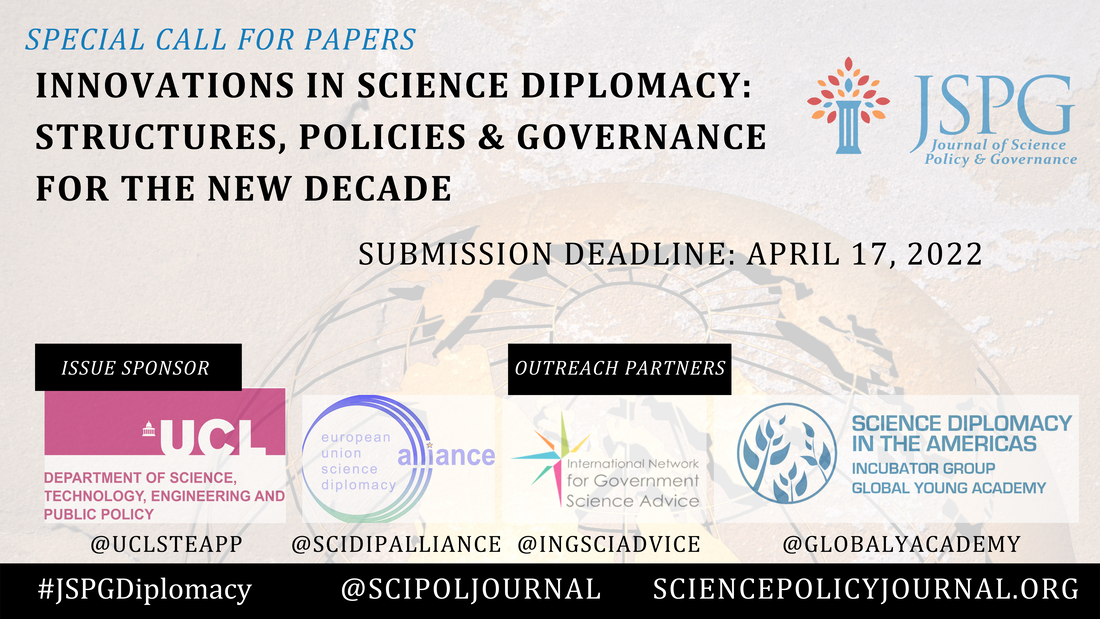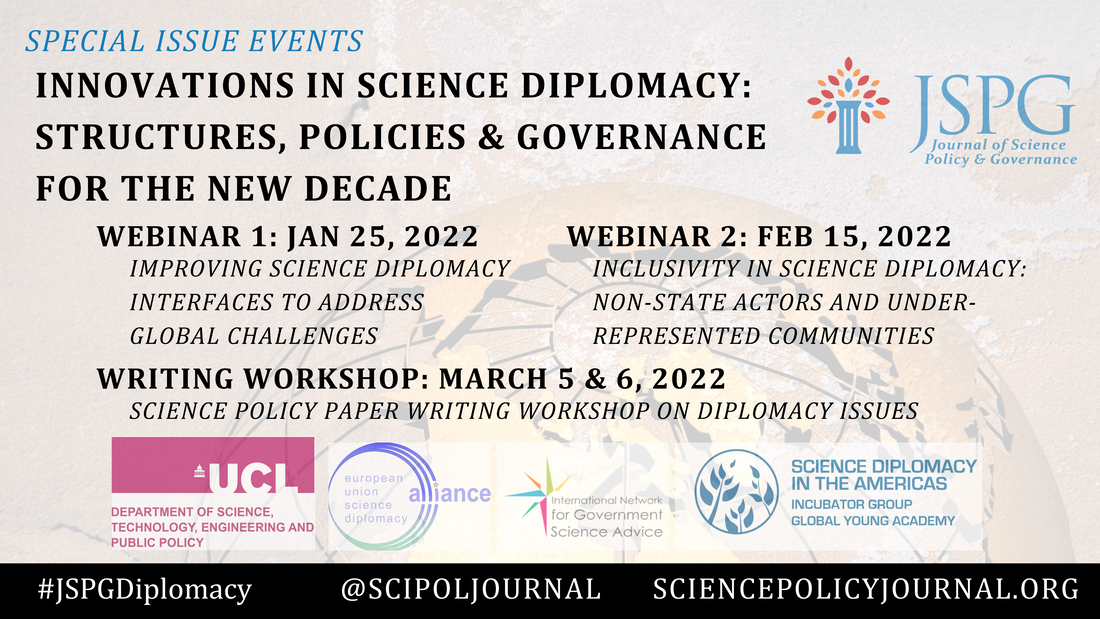Special Topics Call for Submissions
Innovations in Science Diplomacy: Structures, Policies & Governance for the New Decade
The deadline has passed.
Many of the challenging global issues of our times are underpinned by STI, and require evidence-informed, multi-stakeholder and transdisciplinary approaches. UCL STEaPP and JSPG look forward to emerging scholars and young leaders’ fresh look and innovative ideas which are key to building better science diplomacy interfaces, governance structures and global policies.
— Joanna Chataway, Professor and Head of Department of Science Technology, Engineering & Public Policy, University College London
As we reflect on the essential role that young people play in international science diplomacy, JSPG and UCL STEaPP are thrilled to launch this call for papers and competition facilitating substantial engagement of the next generation in shaping the future the field for a better global society in the next decade and beyond.
— Adriana Bankston, CEO & Managing Publisher, Journal of Science Policy & Governance
SPECIAL CALL FOR SUBMISSIONS:
The Journal of Science Policy & Governance (JSPG) and the Department of Science, Technology, Engineering and Public Policy (STEaPP) at University College London (UCL) are pleased to launch a call for papers focused on the latest policy developments and issues in science diplomacy, on Innovations in Science Diplomacy: Structures, Policies & Governance for the New Decade.
Students, postdocs, policy fellows, early career researchers and young professionals from around the world are invited to submit op-eds, policy memos, policy analyses and other articles addressing issues at the intersection of science and diplomacy. Submission deadline: April 17, 2022.
This issue is supported in-kind by outreach partners from the International Network for Government Science Advice (INGSA), the European Union Science Diplomacy Alliance and the Global Young Academy Incubator Group on Science Diplomacy in the Americas.
Follow JSPG on Twitter, Facebook, LinkedIn, Instagram, and YouTube. Join our monthly newsletter. Tweet using #JSPGDiplomacy.
Students, postdocs, policy fellows, early career researchers and young professionals from around the world are invited to submit op-eds, policy memos, policy analyses and other articles addressing issues at the intersection of science and diplomacy. Submission deadline: April 17, 2022.
This issue is supported in-kind by outreach partners from the International Network for Government Science Advice (INGSA), the European Union Science Diplomacy Alliance and the Global Young Academy Incubator Group on Science Diplomacy in the Americas.
Follow JSPG on Twitter, Facebook, LinkedIn, Instagram, and YouTube. Join our monthly newsletter. Tweet using #JSPGDiplomacy.
Three Best Papers Competition:
Following submission review via the JSPG editorial review process, a competition review committee will select the top 3 publications. Authors of the top 3 articles will be invited to present at a dedicated science diplomacy event featuring representatives of different countries and international organizations in Fall 2022. The criteria by which competition winners will be chosen can be found in this rubric.
All published authors will be supported through strategic communications and interviewed for episodes of JSPG's podcast SciPol SoundBites and will be invited to participate in outreach events and opportunities organized by JSPG and UCL STEaPP once the issue is released.
All published authors will be supported through strategic communications and interviewed for episodes of JSPG's podcast SciPol SoundBites and will be invited to participate in outreach events and opportunities organized by JSPG and UCL STEaPP once the issue is released.
Guiding Events:
To facilitate high-level discussions on these topics leading up to the submission deadline, JSPG and UCL STEaPP will organize 2 webinars with expert perspectives on science diplomacy, and a policy writing workshop to help prospective authors improve their submissions to the issue. The events will be co-organized with and include participants from outreach partner organizations.
Please register for the webinars and writing workshop below. More information on these events will be shared as it becomes available. Questions regarding these events may be directed to JSPG's Senior Advisor for International Engagement JC Mauduit.
Please register for the webinars and writing workshop below. More information on these events will be shared as it becomes available. Questions regarding these events may be directed to JSPG's Senior Advisor for International Engagement JC Mauduit.
Webinar 1: January 25, 2022: Improving science diplomacy interfaces to address global challenges. - Watch it here
Webinar 2: February 15, 2022: Inclusivity in science diplomacy: non-state actors and under-represented communities. - Watch it here
Writing workshop: March 5 & 6, 2022: Science policy paper writing workshop on diplomacy issues. - Watch it here
Webinar 2: February 15, 2022: Inclusivity in science diplomacy: non-state actors and under-represented communities. - Watch it here
Writing workshop: March 5 & 6, 2022: Science policy paper writing workshop on diplomacy issues. - Watch it here
Guiding Themes & Questions:
Themes to address may include
Guiding questions
- National, sub-national, and city-led science diplomacy strategies in different contexts
- International (scientific) organizations and high-level, global science diplomacy issues
- Non-state actors (non-profits, Big Tech, multinationals, informal networks, etc.)
- Science diplomacy interfaces and science advice in international and diplomatic settings
- Big Science and international research infrastructures, transnational scientific collaboration facilitated by diplomacy
- The interplay between science, technology, and innovation-diplomacy
- Science diplomacy and development
- Issues of diversity and biases in science diplomacy
Guiding questions
- What policies (national and international) could help foster better interactions between scientific actors on the one hand and diplomatic ones on the other?
- What structures and policies exist at the national, sub-national and city-level for these respective actors to design and grow their engagement in STI issues internationally?
- STI permeates various governmental actors: what kind of structures and policy coordination could facilitate seamless interactions of different actors viewing the domain from their own vantage points?
- How does the understanding and implementation of science diplomacy vary across different international contexts? How can science diplomacy help development?
- How can science advice in international settings, or science advice on STI foreign policy in national settings be improved?
- What should future formal and informal global science diplomacy networks look like to best tackle complex STI-driven issues and achieve positive societal changes?
- What can we learn from policies and diplomatic engagement around Big Science and large international research infrastructures that would ensure a more integrated and equitable worldwide research system?
- What are current pathways for ECRs to get into science diplomacy? What are some the structural issues (in particular: intergenerational, equity, inclusion and diversity) and potential policies that could overcome them?
- What national and international policies are in place to allow non-state actors contribute to inform and influence global governance on high-level S&T issues?
- What are examples or case studies of actions/policies that were designed to address cross-border interests, or help meet global needs and STI challenges?



